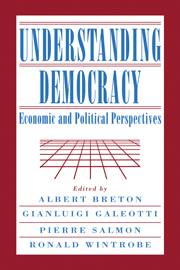Book contents
- Frontmatter
- Contents
- Contributors
- Introduction
- Part I Democracy, the market, and the law
- 1 Democratic stability as a self-enforcing equilibrium
- 2 Democracy, competition, and the principle of Isonomia: An economic analysis of the political exchange as an incomplete contract
- 3 Constitutional democracy: An interpretation
- 4 Necessary and sufficient conditions for a viable democracy
- Part II Democracy and economic growth
- Part III Democratic deficiencies and possible improvements
- Part IV Democratic expectations
- Index
3 - Constitutional democracy: An interpretation
Published online by Cambridge University Press: 05 December 2011
- Frontmatter
- Contents
- Contributors
- Introduction
- Part I Democracy, the market, and the law
- 1 Democratic stability as a self-enforcing equilibrium
- 2 Democracy, competition, and the principle of Isonomia: An economic analysis of the political exchange as an incomplete contract
- 3 Constitutional democracy: An interpretation
- 4 Necessary and sufficient conditions for a viable democracy
- Part II Democracy and economic growth
- Part III Democratic deficiencies and possible improvements
- Part IV Democratic expectations
- Index
Summary
Definitional issues
One might define democracy as a system of government in which the citizens choose either the persons to govern them, or the policies of the government, or both. If we define a constitution as a set of rules by which the above choices are made and the set of constraints upon the citizens and those in government, then all democracies have constitutions; for all democracies have rules for electing representatives, for deciding referenda, and for running town meetings. All democracies have rules, implicit or explicit, constraining those in and out of government.
Although all democracies have constitutions that define their institutions of government, all do not have written constitutions. The best known example of a country without a written constitution is, of course, Great Britain. Its governmental institutions are the result of an evolutionary process spanning seven centuries. So venerable are the institutions of government in Great Britain that scholars and laymen alike commonly speak of “The British Constitution” as if it was a document like the U.S. Constitution that could be read and whose language could be interpreted, a document that could in its entirety be discarded or rewritten. Most importantly, because the British Constitution is unwritten, it is difficult to interpret it and say when it is violated. Thus in Britain no Supreme or Constitutional Court exists that has the authority to declare acts of Parliament in violation of the constitution and thereby null and void.
- Type
- Chapter
- Information
- Understanding DemocracyEconomic and Political Perspectives, pp. 64 - 87Publisher: Cambridge University PressPrint publication year: 1997
- 1
- Cited by

